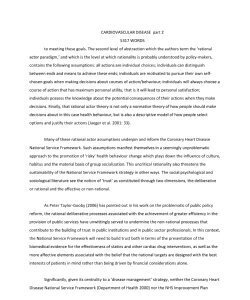CARDIOVASCULAR DISEASE to meeting these goals. The second level of abstraction which the authors term the ‘rational actor paradigm,’ and which is the level at which rationality is pr part 25317 WORDS
CARDIOVASCULAR DISEASE to meeting these goals. The second level of abstraction which the authors term the ‘rational actor paradigm,’ and which is the level at which rationality is pr part 25317 WORDS
CARDIOVASCULAR DISEASE part 2
5317 WORDS
to meeting these goals. The second level of abstraction which the authors term the ‘rational actor paradigm,’ and which is the level at which rationality is probably understood by policy-makers, contains the following assumptions: all actions are individual choices; individuals can distinguish between ends and means to achieve these ends; individuals are motivated to pursue their own self-chosen goals when making decisions about courses of action/behaviour; individuals will always choose a course of action that has maximum personal utility, that is it will lead to personal satisfaction; individuals possess the knowledge about the potential consequences of their actions when they make decisions. Finally, that rational actor theory is not only a normative theory of how people should make decisions about in this case health behaviour, but is also a descriptive model of how people select options and justify their actions (Jaeger et al. 2001: 33).
Many of these rational actor assumptions underpin and inform the Coronary Heart Disease National Service Framework. Such assumptions manifest themselves in a seemingly unproblematic approach to the promotion of ‘risky’ health behaviour change which plays down the influence of culture, habitus and the material basis of group socialization. This uncritical rationality also threatens the sustainability of the National Service Framework strategy in other ways. The social psychological and sociological literature see the notion of ‘trust’ as constituted through two dimensions, the deliberative or rational and the affective or non-rational.
As Peter Taylor-Gooby (2006) has pointed out in his work on the problematic of public policy reform, the rational deliberative processes associated with the achievement of greater efficiency in the provision of public services have unwittingly served to undermine the non-rational processes that contribute to the building of trust in public institutions and in public sector professionals. In this context, the National Service Framework will need to build trust bo
